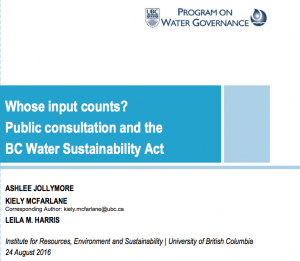Jollymore, A., K. McFarlane & L. M. Harris. (2016). Whose input counts? Public consultation and the BC Water Sustainability Act. The University of British Columbia, Institute of Resources, Environment and Sustainability.
INTRODUCTION: Public consultation has become an increasingly important feature of policy-making, intended to enhance democratic engagement by enabling citizens to influence plans and policies that affect them (Patten, 2001; Kaehne & Taylor, 2016). Consultation processes provide broad public input, with the intention of improving the outcomes (in terms of equity, sustainability, and so forth), as well as the legitimacy of government decisions (Shipley & Utz, 2012). However, consultation’s poor alignment with decisionmaking processes, lack of transparency, and limited influence on policy and planning have at times earned it a reputation as tokenistic (Carr, 2012; Carvalho et al., 2016; Cheeseman & Smith, 2001). Thus, a key question for policy-makers and the public is whether public consultation is delivering more democratic policy outcomes. Here we investigate precisely whether, and the degree to which, public input influences policy outcomes.
Specifically, this study provides a detailed analysis of the large-scale consultation process undertaken for British Columbia’s Water Act Modernization (WAM), which received significant public attention and government investment. During this process, the provincial government held three rounds of public consultation from 2008-2013, resulting in over 4000 submissions that were used to refine BC’s new Water Sustainability Act (WSA, 2014).
We critically examined the influence of different submitter groups on policy outcomes, and thus the role of consultation in the broader policy-making process. To do this, we developed a novel quantitative approach to systematically analyze participants’ submissions on policy proposals, and compare those responses with resultant policies.

